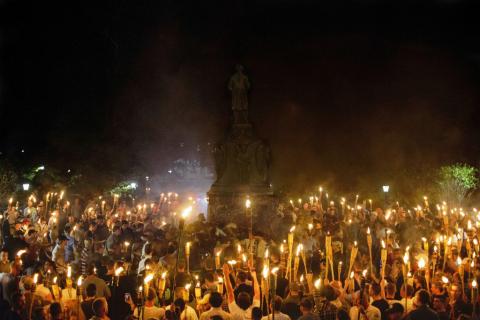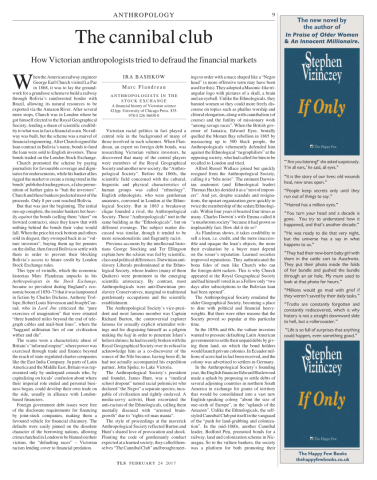Ira Bashkow
Ph.D. University of Chicago 1999
Specialties
Social and cultural theory, corporate organizations, financial markets, globalization, development, race studies, ethnographic research methods, history of anthropology, Oceania.
I’m currently writing a book, The Corporate Form, which gives a fresh answer to the vexed question of what is a corporation, providing a humanistic conception of the corporation that is more versatile and well-founded than the individualistic, finance-centric, market-like models current in economics and law. Although corporations are often thought of as vehicles for commerce requiring sanction of law, their history is much older than their adaptation to pursue profit. Indeed, the corporate form is more ancient than the institution of state-enacted law itself, appearing since remote times in elite households, religious bodies, and other variant forms in different parts of the world. Wherever they occur, corporations are underpinned by the culturally conventionalized forms of action, language, and thought by which people collectively co-create reified agencies that have real force in the world. This view of the corporation as a cultural form has profound implications for debates in business and law about corporate social responsibility and shareholder primacy.
I have done long-term ethnographic field research in two regions of the Pacific island nation, Papua New Guinea: Orokaiva in Oro Province and Arapesh in East Sepik Province. I wrote about some of this work in my book, The Meaning of Whitemen: Race and Modernity in the Orokaiva Cultural World, which explores how “whitemen” and the concept of development are understood by Orokaiva people in terms of their own cultural assumptions and evaluations of western power, wealth, and race privilege. In the book I examine the ambivalent meanings that “the whiteman” holds for Orokaiva, exploring the nature of racial stereotypes outside our own accustomed landscape of racial politics and assumptions. I show how stereotypes can be grounded in “raced” material objects other than living persons, explaining why they persist so stubbornly in the face of counterevidence.
I also have an interest in the history of anthropology, including understanding how past anthropologists were perceived by the people they studied and how this affected their findings. I’ve written about the anthropologist David Schneider’s fieldwork on Yap (Micronesia) during the U.S. naval colonial administration of that island after World War II. With Lise Dobrin I’ve written about Margaret Mead and her joint fieldwork with Reo Fortune in New Guinea in 1931-1932, on the basis of which the two came to contradictory conclusions about Arapesh culture, with Fortune disputing the view of the Arapesh that Mead published in her famous book, Sex and Temperament.
Lise and I also have a joint project about the life and work of the Papua New Guinean jurist, philosopher, and politician Bernard Narokobi, who we had the privilege of coming to know during our own Arapesh fieldwork
Finally, I have an abiding interest in the concept of culture as pioneered by Boasian anthropologists of the early 20th century. The concept remains fundamental for understanding the plasticity of human nature and the diversity of people’s lifestyles, tastes, abilities, and ways of living—their “cultures”. What species-level characteristics allowed for the emergence of human culture and its diversity? What processes of human growth and development ensure that human individuals grow up as cultural beings? Why do people tend to think that so much about their own culture is necessary and natural when in reality it could be different and it changes over the course of history? Why is culture such an important aspect of people’s identity? Such questions are as important today as ever.
My undergraduate teaching includes courses on “The Concept of Culture”, “The Anthropology of Globalization”, “Theories of the Corporation”, and “The World Is Our Laboratory: How to Do Ethnographic Field Research”.
At the graduate level, I teach classes on social theory, race studies, NGOs and international development, the history of anthropology, Melanesian ethnography, ethnographic research methods, and ethnographic writing.
Selected Publications
2017 - Three Lessons I Learned From Charlottesville: The recent violence in Charlottesville, Virginia, likely won’t be the last attempt by white supremacists to stoke racial conflict. An anthropologist offers insights to other communities that might face similar challenges.
2017 - Anthropology: The Cannibal Club: How Victorian anthropologists tried to defraud the financial markets. [Review of Anthropologists in the Stock Exchange, by Marc Flandreau] TLS: The Times Literary Supplement, no. 5943, February 24, 2017, pp. 9-10. Republished at
http://histanthro.org/anthropologists-in-the-stock-exchange/
2016 - Why a Newsletter? History of Anthropology Newsletter (HAN), vol. 40, no. 1.
2016 - A George Stocking Reading, in George Stocking’s Memory. In “Forum: Voicing the Ancestors", HAU: Journal of Ethnographic Theory, vol. 6, no. 3, pp. 368-372
2016 - George Stocking’s Stockings: Needlepoint to Pique the Historical Imagination. History of Anthropology Newsletter (HAN), vol. 40
2016 - Review of Ethnography in Today’s World: Color Full Before Color Blind, by Roger Sanjek. American Anthropologist, vol. 118, no. 3, pp. 691-692
2015 - Comment on “Back to Boas, Forth to Latour: An Anthropological Model for the Ontological Turn” by Lars Rodseth. Current Anthropology, vol. 56, no. 6, pp. 876-877
2014 - Afterword: What Kind of a Person is the Corporation? Theme issue, “Imagining the Corporate Person,” PoLAR: Political and Legal Anthropology Review. vol. 37, no. 2, pp. 296-307
2013 - Village Lessons [Review of The World Until Yesterday by Jared Diamond.]. Times Literary Supplement (TLS)
2012 - Review of Anthropological Intelligence: The Deployment and Neglect of American Anthropology in the Second World War. by David Price. American Ethnologist vol. 39, no. 4, pp. 840-841.
2012 - Review: After the Cult: Perceptions of Other and Self in West New Britain (Papua New Guinea), by Holger Jebens. New York: Berghahn Books, 2010. Anthropos 107:270-271.
2011 - Old Light on a New Controversy: Alex Rentoul’s Account of the Trobriand Women’s Sagali. History of Anthropology Newsletter 38:2.
2010 - Arapesh Warfare: Reo Fortune's Veiled Critique of Margaret Meads Sex and Temperament. American Anthropologist 112 (3):370 - 383. (With Lise M. Dobrin).
2010 - The Truth in Anthropology Does Not Travel First Class: Reo Fortune's Fateful Encounter with Margaret Mead. Histories of Anthropology Annual 6: 66-128. (With Lise Dobrin).
2007 - The Historical Study of Ethnographic Fieldwork: Margaret Mead and Reo Fortune among the Mountain Arapesh. History of Anthropology Newsletter 34 (1) 9-16. (With Lise Dobrin).
2006 - Review of Malinowski: Odyssey of an Anthropologist 1884-1920, by Michael Young. Journal of the Polynesian Society. 115, no. 1, pp. 104-107
2006 - Pigs for Dance Songs: Reo Fortune's Empathetic Ethnography of the Arapesh Roads. Histories of Anthropology Annual 2. (With Lise Dobrin).
2006 - The Meaning of Whitemen: Race and Modernity in the Orokaiva Cultural World. Chicago: University of Chicago Press.
2004 - A New Boasian Anthropology: Theory for the 21st Century. American Anthropologist 106 (3):433-434 (With Matti Bunzl, Richard Handler, Andrew Orta, and Daniel Rosenblatt).
2004 - A Neo-Boasian Conception of Cultural Boundaries American Anthropologist. vol. 106, no. 3, pp. 443-458.
2000 - "Whitemen" Are Good to Think With: How Orokaiva Morality is Reflected on Whitemen's Skin. Identities: Global Studies in Culture and Power 7:281-332.
2000 - Confusion, Native Skepticism, and Recurring Questions About the Year 2000: 'Soft' Beliefs and Preparations for the Millennium in the Arapesh Region, Papua New Guinea. Ethnohistory 47:133-169.
1996 - To Be His Witness if That Was Ever Necessary: Raphael Brudo on Malinowski’s Fieldwork and Trobriand Ideas of Conception. History of Anthropology Newsletter 23 (1):3-11.
1995 - The Stakes for Which We Play Are Too High to Allow of Experiment: Colonial Administrators of Papua on Their Anthropological Training by Radcliffe-Brown. History of Anthropology Newsletter 22 (2):3-14.
1991 - The Dynamics of Rapport in a Colonial Situation: David Schneider's Fieldwork on the Islands of Yap. In Colonial Situations: Essays on the Contextualization of Ethnographic Knowledge. George Stocking, ed. Pp. 170-242. Madison: University of Wisconsin Press.


